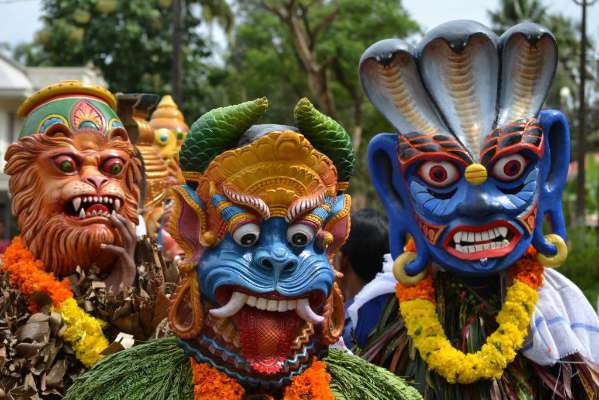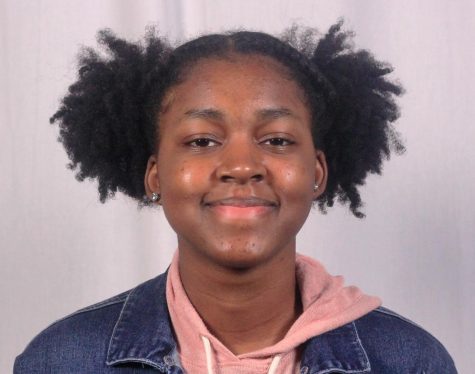The Haunted History of Halloween

Masks from the Yam Festival in African culture
Every year on October 31st people stream out of their houses, costume or not, and go door to door with family and friends in search of candy and fun. Others stay inside to binge watch scary movies or find alternate ways to celebrate. However, most don’t know how this holiday came to form.
Halloween is believed to have begun 2,000 years ago near Ireland. It was started by the Celts who referred to the holiday as Samhain. The Celts lit bonfires and wore costumes with the intent to ward off ghosts. This festival marked the beginning of winter. At the time winter was associated with disease and death.
However, as people evolve so do their holidays. Eighth century Pope, Gregory III, decided the day that Samhain was celebrated should be a day to honor all saints. Thus, what we now know as Halloween made the transition from “Festival of Samhain” to “All Saints Day,” the two holidays merging into one another. At this time, the holiday was celebrated on November first. October 31st, the day before, had always been called Hallows Eve. This was the day that would later become Halloween, and even later yet have its own festivities associated with it.
When Halloween came to America, it was mostly celebrated by southern states only. Once more immigrants began to come over, the Irish having the most influence, they began to make the celebration of Halloween popular. America was developing its own identity at the time and ended up tossing All Saints Day out completely. More than that, the growing diversity in America allowed for a mix of English and Irish traditions from the Holiday’s own origin and resulted in trick-or-treating. At that time, people would ask for candy, money, or food, the tradition of wearing a costume never wavering. Halloween lost its religious history around the end of the 1800s when participants began to gear toward celebrating ghosts rather than warding them off, pranks, and witchcraft.
In present day, many people neglect to take part in Halloween due to the fact that it no longer has any characteristics of the religious motivations that started it. Kennedi Hogg, sophomore, is one of those who make the choice not to participate due to religious reasons.
“The meaning that [Halloween] began to adopt goes against a lot of what the Bible says. To me, Americans perpetually celebrate it as part of their culture like its positive when really they’ve turned it into something spiritually negative,” Hogg said. “They don’t really care about the meaning they just want to go out and have fun.”
Though she doesn’t participate in the festivities, Hogg does participate in mild alternatives she believes to be a little more closely in tune with her religious beliefs. These activities can be as simple as watching scary movies or eating candy.
“I’m glad I can still participate in the way I want instead of being involved in practices I think aren’t religious. There’s nothing wrong with people who do celebrate but it’s good people who don’t can still be involved,” Hogg said.
Similarly, Thaovy Nguyen, junior, celebrates in spite of her religion but with the support of her culture, being Vietnamese.
“I think people don’t know that Asians also celebrate Halloween because of their introverted nature in the worldwide arena. We still celebrate Halloween but since its become more of a Western form of fun, we typically just throw a lot of parties,” Nguyen said.
Halloween to Nguyen is a time to focus on fun rather than the stress associated with daily life this time in the school year. She still celebrates though the Catholic Church doesn’t very much support participation, optioning out in favor of Harvest Festivals, despite their role in the creation of the holiday.
“I celebrate Halloween because it’s a night of expression and freedom from your everyday life. When I was younger, I liked Halloween for the treats. Nowadays, I find Halloween enjoyable through the fact that you are able to hang out with all your friends,” Nguyen said. “Asians are very strict about success and Halloween is a time to be free of that.”
In contrast, Nancy Okonkwo, junior, doesn’t celebrate because Halloween isn’t a holiday the majority of Africans choose to be a part of. Trick-or-treating anyway can result in shame being brought on your whole family.
“Africans as a whole are big on tradition and even if they weren’t, most people down there wouldn’t even know what Halloween is. I don’t participate because Nigerians are very superstitious and my parents have very real fears of demons and evil spirits. To participate is to publicly worship demons,” Okonkwo said. “We have festivals throughout the year where the men dress up in monster costumes and everyone dances but those are more traditional/cultural than being associated with some holiday,” Okonkwo said.
Because they are no longer in Africa, when Halloween rolls around the Okonkwo family practices their own alternative to the holiday.
“We usually watch scary movies as a family and my dad will buy us candy. Africans are becoming more open to it but I’m glad we have a way to plug into the season anyway that doesn’t involve creepy costumes,” Okonkwo said.
Halloween nowadays is clearly not what it used to be. Customs and beliefs have changed and many cultures and religions make an active decision to either participate in the festivities or find an alternate way to celebrate. Halloween has something to offer for everybody whether it be a trick or a treat.

